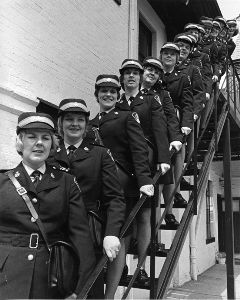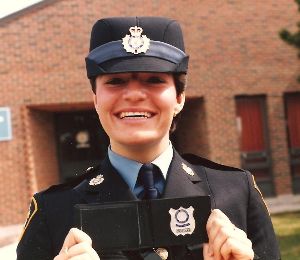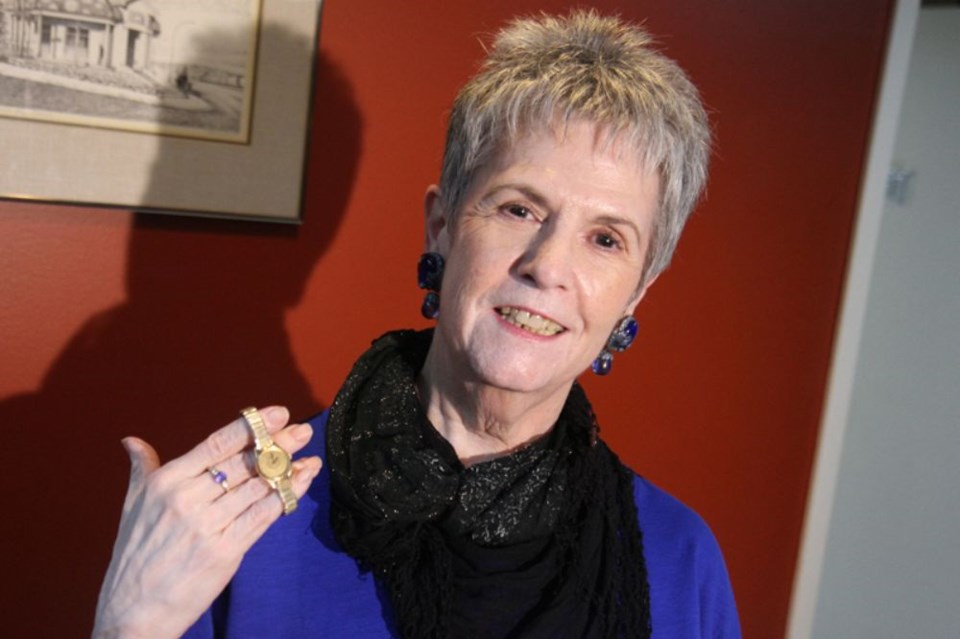With a snub-nose .38-pistol in her purse and a skirt just above the knees, Joan Green became one of the first female OPP officers in 1974.
“Try climbing a fence with a skirt, pantyhose, granny shoes and a purse,” she says, remembering those early days. “If you stop an 18-wheeler truck, try climbing up those big steps in a skirt.”
It took about a year of loud complaining before they were given pants and a duty belt. From then on climbing fences and other police duties became a little easier for Green and her fellow female officers.
“It was a silly move putting us in skirts,” she says.
Green was 26 when she became an OPP officer. She was hired in 1966 in a civilian capacity, doing clerical work in Geraldton and then Toronto. When she learned the force had decided to hire its first female class eight years later, she was eager to sign up.
“It was always a dream of mine and because I was already working for the OPP, I wanted to work with them especially. So when they decided to hire, I got rather excited.”
This year marks the 40th anniversary of women as uniform members of the province’s police force and Green wasn’t only a member of the first women’s class, but was also the first female officer to retire in 1997.
That milestone forced the provincial organization to design a new retirement watch.
“The men’s watch was a little too big,” she says.
 Green became a uniform member of the OPP in Toronto and spent time in Peterborough before moving back to the Northwest where she worked for the Thunder Bay and Kakabeka Falls detachments.
Green became a uniform member of the OPP in Toronto and spent time in Peterborough before moving back to the Northwest where she worked for the Thunder Bay and Kakabeka Falls detachments.
Looking back on her career, Green doesn’t see herself as paving the way for women in the OPP. The members of that first class just did their work with the male officers and tried to fit in.
And they did fit in; the men’s attitudes generally were accepting.
“There’s always problems with some, but that was their problem. It wasn’t mine,” Green says. “It makes a difference how the people you work with accept you and I was always accepted. As long as you do your work, they don’t mind.”
There was a learning curve for the organization and not just when it came to the uniform. Women trained separately from men in the beginning.
“Because we were the first class, they didn’t know how to do anything,” says Green, adding that it took a couple of years for the force to get its footing.
“It wasn’t just us learning. It was the entire OPP learning to deal with women on the force.”
Although her career was rewarding, Green says it was more fun retiring.
With nothing but praise for her coworkers and pride for being a member of the first class, after 23 years she was ready to say goodbye.
“It was a difficult job. When you’re not used to dead people and bad accidents, that’s all difficult,” Green says, adding that life as a police officer is not as depicted on television.
“It can have some difficult moments, tense moments, sad moments, but it’s a good job.”
In 1976, women made up 1.6 per cent of the OPP’s uniform members. By 1995, that number had grown to 13.6 per cent and Green says it was nice to see more women join the force over the years and show they could do the job as well as their male colleagues.
Today, women represent more than 20 per cent of the OPP’s uniform members and there have been females in all nine ranks, including commissioner with Gwen Boniface holding that position from 1998 to 2006.
When Deb Tully joined the OPP in April 1986, she was widely accepted by her peers. The civilian public, however, oftentimes viewed the role of a policewoman as a novelty.
“I certainly got lots of interesting glances and I even had people coming up to me and asking me ‘gee, do you carry a gun?’ Tully says about her early days.
 Now a sergeant with the northwest detachment, Tully remembers those same people suddenly noticing the gun on her hip, which would be followed by questions about her police-issued weapon..
Now a sergeant with the northwest detachment, Tully remembers those same people suddenly noticing the gun on her hip, which would be followed by questions about her police-issued weapon..
Today she feels women are seen as an integral part of policing.
“People don’t find it a novelty the way they used to when a woman police officer tends to an issue and is involved with the public,” Tully says. “We’re all seen as police officers for the most part.”
Tully joined the OPP 28 years ago because she felt it was a job that would challenge all of who she was; she wouldn’t be pigeon-holed into doing one particular activity.
“What I enjoy the most is that the OPP and policing in general has all kinds of different activities you can do throughout your career, different opportunities and it certainly allows you almost to be faced with something new each day.”
When she first came on the job, Tully says most, if not all, women held the rank of provincial constable. Since then she’s noticed women progress through the ranks all the way to the top and to participate in all the different specialty areas.
The Northwest detachment will be celebrating 40 years of women in the OPP this Thursday and Tully says she was surprised by the milestone.
“It’s been such an interesting career and such an amazing journey that the 28-and-a-half years that I’ve spent in the OPP have flown by.
“It’s been impressive to see the changes over that span of time, having had a commissioner who was female, seeing that women are represented at all levels. I think initially it took a little bit of time to start having that integration occur but I certainly see there are no limitations now.”
